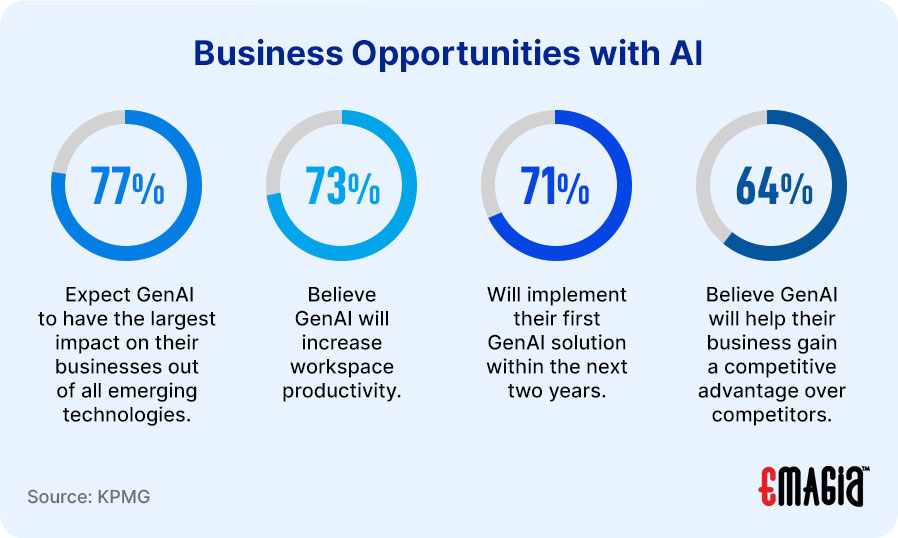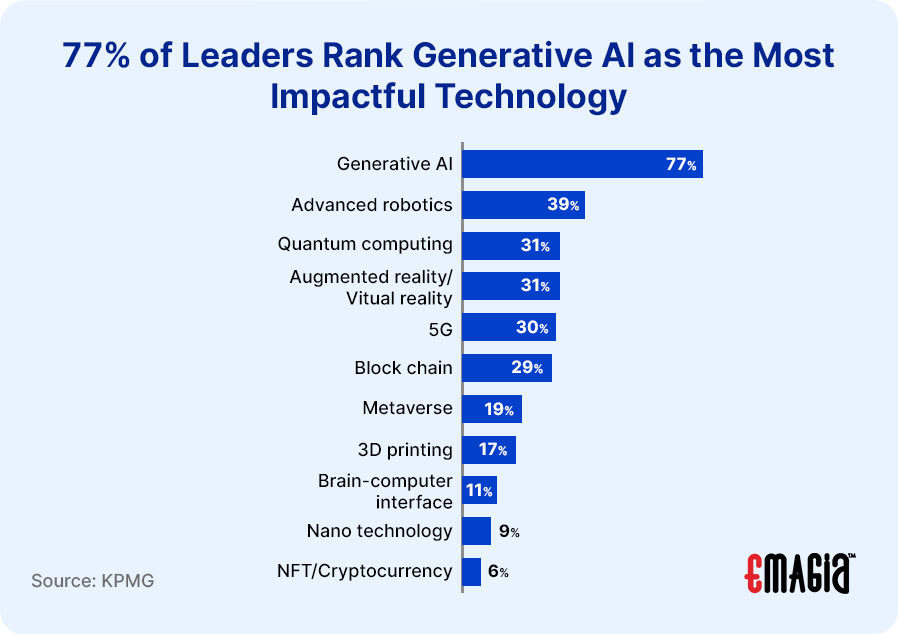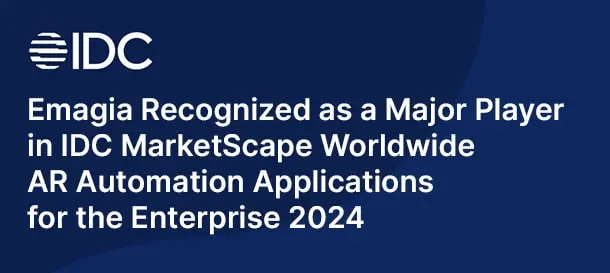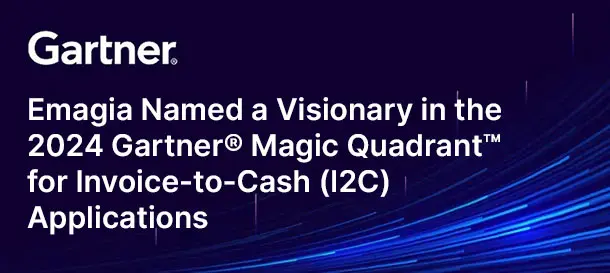As the landscape of artificial intelligence undergoes a transformative evolution coming out of its “mainstreaming” year, a recent KPMG report sheds light on the rising tide of generative AI adoption among enterprises. While only 9% have currently embraced this cutting-edge technology, a substantial 71% are gearing up to implement their first generative AI solution within the next year or two.
As we know, Generative AI (GenAI) leverages deep learning technologies to transcend the boundaries of human communication. With the innate ability to generate content akin to human output across various domains such as language, art, music, and programming code, GenAI is positioned as a game changer for businesses seeking to enhance efficiency and innovation.
And KPMG’s research, which includes a survey of business executives, finds that company leaders are bullish on what GenAI can bring to their businesses in ways such as increased worker productivity, escalating revenue, and improved customer interaction. That should an increasingly diminished surprise as GenAI attracted more than $1.37 billion in investor capital – and that was through the end of 2022, before ChatGPT’s big breakout made AI the hottest trending topic of 2023 and opened the door for more industry specific GenAI solutions, like Emagia’s GiaGPT.
However, many openly admitted a fear of quick implementations stemming from their own lack of knowledge or staffing with experience in developing or implementing any significant AI-based solutions designed to move the needle for the business.
The Potential Impact and Accelerated Growth
The potential applications of generative AI across diverse business use cases promise significant savings in time, money, and effort. Research, development, and adoption of generative AI are occurring at an astonishing pace, indicating a paradigm shift in how enterprises approach problem-solving and innovation.

KPMG found business leaders, especially in areas like finance and credit, are increasingly intrigued by the capabilities of generative AI and its potential to reshape customer interactions, workplace dynamics, and revenue growth. Regardless of sector or function, 77% rank generative AI as the emerging technology with the most significant impact on their businesses in the next couple of years.
However, not everything is smooth sailing. Implementation challenges loom large, with the primary obstacle being the scarcity of skilled talent internally to develop and implement
AI-based solutions. Only 1% of respondents claim to possess the necessary
in-house skills for generative AI implementation without significant help from an external partner with extensive experience in the area.
Integration Capabilities and External Partners/Providers

The majority of KPMG respondents acknowledged their intent to engage external partners for critical aspects of developing and implementing GenAI. These include model testing and validation, algorithm development and optimization, integration with existing systems, and
data acquisition and processing. Simply put: most businesses without existing, extensive knowledge about AI can’t afford to go it alone. The risks are too high.
With the rapid adoption of generative AI, attention on regulatory guidelines is growing, and compliance is becoming crucial for maintaining reputation and trust. Non-compliance could result in significant monetary impacts, emphasizing the need for a cautious approach to implementation.
Additionally, an unrefined solution created in-house or some fly-by-night AI solutions provider with a dubious track record could alienate customers, ruin brands, and lead to legal ramifications if it works improperly or, as many executives are concerned, relies on erroneous insights and data as source material. This is why Emagia always encourages businesses to carefully vet their potential external partners and provides. In essence, consider who has been in the AI world, producing quality and/or award-winning solutions versus more fly-by-night companies that have flocked to AI only after it became trendy in the mainstream within the last year or so.
7 Actions to Take on AI
Success in the transition to a more AI-based business world relies heavily on having a well-considered plan of attack. The following are seven of the recommendations that are part of KPMG’s comprehensive guidance:
Be a First Mover: Embrace generative AI early to gain a true first-mover advantage, as the rapidly evolving market widens the gap between first movers and fast followers.
Respond and Adapt: Prepare for inevitable changes by assessing, adapting, and pivoting strategies to harness the enormous potential of generative AI. Designate a leader for cross-enterprise coordination to drive efficiency and prioritize investments.
Find Your Generative AI North Star: Develop a clear strategy and vision to address the unique capabilities and risks of generative AI, serving as a guiding “North Star” for successful implementation.
Address Critical Talent Questions: Manage communication about shifting jobs, reengineered processes, and new behaviors resulting from generative AI adoption. Position generative AI as a tool to enhance human capabilities and act as an assistant, not as a replacement.
Develop Generative AI Literacy: Like the “Democratization of AI” in Emagia’s 2004 AI preview also notes, investing in developing literacy around GenAI for leaders and the workforce is crucial for buy-in. Debunk myths, promote education, experimentation, and a positive culture for responsible adoption.
Unleash Generative AI Broadly: Consider a systematic, top-down adoption approach or, for bold innovators, disseminate generative AI everywhere, allowing every function to experiment and unlock its potential.
Manage Change Boldly and Broadly: Recognize generative AI as a transformative force, requiring leaders to think differently about industry dynamics, business models, operating models, competitors, and talent. Make clear decisions to navigate uncharted directions.
In conclusion, as enterprises prepare to embrace generative AI, careful consideration of challenges, risks, and planning will be essential for a successful and sustainable implementation, ensuring that businesses harness the best of this groundbreaking technology while reducing potential obstacles and pitfalls.




